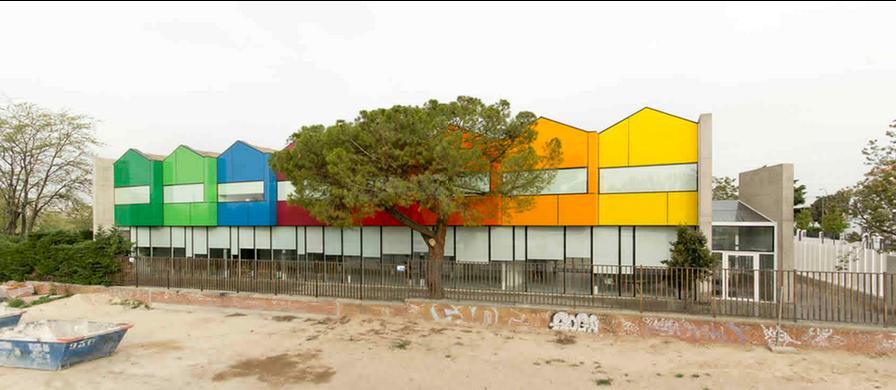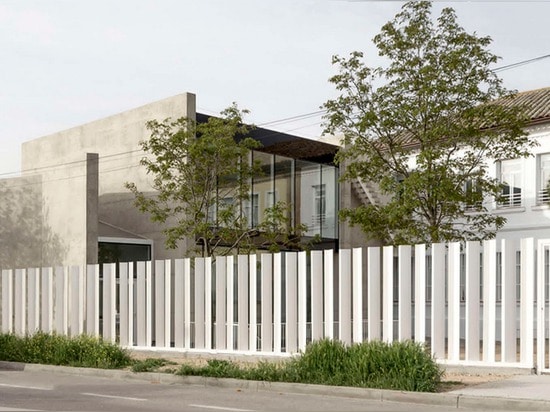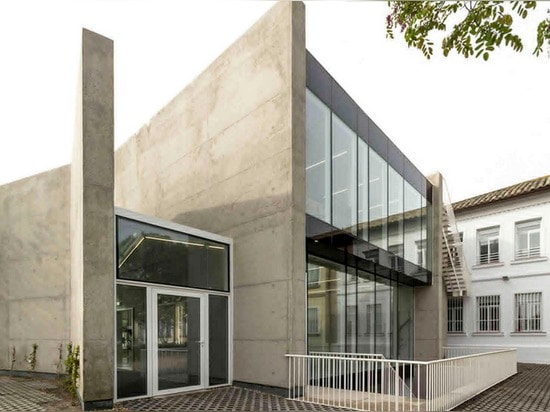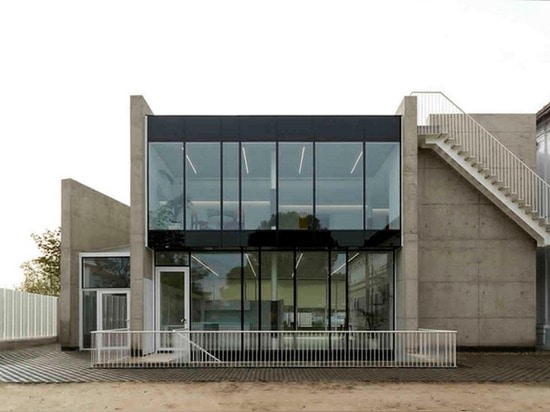
#PUBLIC ARCHITECTURE PROJECTS
Esther Koplowitz Foundation for patients with cerebral palsy
The current centre, granted by Madrid City Hall, is housed in a building from 1950 attached to a development of mainly single storey houses.
It is located beside the disused military barracks near the Extremadura highway. Renovated in 1995, it shows inadequate conditions as a school and residence for children who suffer CP. Due to the increasing demand for places and the fact that it was the only specialized residence in La Comunidad de Madrid, an extension with the very best conditions was necessary and addressed the following shortcomings:
- Insufficient space; up to four children per room.
- Inadequate connection between buildings; with access from outdoors, exposing the children to significant temperature changes.
- The fact that there was only one multipurpose hall which did not meet requirements to carry out all the activities.
- Insufficient evacuation routes and emergency systems; when the lift was out of order, the rooms were inaccessible.
Phase 1: DORMITORIES and MULTIPURPOSE ROOMS
This phase focuses on the extension of the existing building through the creation of a new block of rooms and multipurpose halls adjoined to its southeast façade. The new rooms will therefore better accommodate the children’s needs (2 per bedroom) and the rest of the halls will meet requirements. The extension is a 2350 m2 plan distributed over three storeys. The ground floor consists of a glassed-in multipurpose hall for stimulation above which are small houses where the children sleep from which they can see, and be seen. The intention is to highlight the presence of the building in its environment, becoming a feature in its area.
A new main entrance is projected from calle Andonis which directs visitors towards the entrance of the extension, limiting the current entrance through calle Gordolobo to a service entrance for staff and car park.
The volume exhausts the buildable area of the plot, leaving sufficient space for access for the fire services along the side of the plot.
The work has been accomplished with no disruption to day to day activities. Connection of the two volumes was not completed until the very last phase of the project, done at the end of the corridor that goes across the length of the old building, minimizing discomfort.
COLOURFUL HOUSES
The project offers a happy an optimistic overall image; a place which is home to the hope for improvement. On the one hand the project is well integrated, adapting its scale to that of the neighborhood, of small houses that surround it. On the other hand it gives each bedroom a unique personality thanks to a colour range that achieves unity and uniqueness at the same time.
In the ground floor an unbroken glass façade creates an airy plinth open to the landscape. Over which the bedrooms of colours are raised, private and quiet; obtaining a constructed horizon with a panoramic window, from which viewers will be able to see out, even while sitting.
BASEMENT
Below ground level are the installations, store room, laundry room and changing rooms together with the administration area which opens to a patio through a large window that creates a comfortable and cosy atmosphere.
MULTIPURPOSE HALLS
On the ground floor there are several spaces for multipurpose halls which have a total area of 400m2 and a height of 3.5 m. It faces southeast and over the garden, and provides natural light in every hall.
Access is solved through a glass and concrete cube which leads to a meeting room for visitors. There is another independent hall in a more reserved area dedicated to intensive care.
DORMITORIES
The floor planned for bedrooms covers 500 m2 has 10 new 20 m2 bedrooms for two children each that meet all climate control requirements.
A single 4m panoramic window, lets in natural light and frames the view. It is made with a double sheet of glass with sun control that avoids heat loss in winter and heat gain in summer.
Climate control is achieved with air conditioning ducts and underfloor heating. The floor is constructed from a highly resistant and durable PVC and the walls have a vinyl siding that facilitate cleaning and maintenance.
The bedrooms have a maximum height of 3.7 m for spaciousness and wide doors that facilitate access to stretchers and wheelchairs.
ROOF
Above the rooms, a 200 m2 roof garden that serves as a thermal and acoustic insulator, reducing the building’s energy demand and purifying the air at the same time. In this way the garden area that was lost to the new building is recovered.





